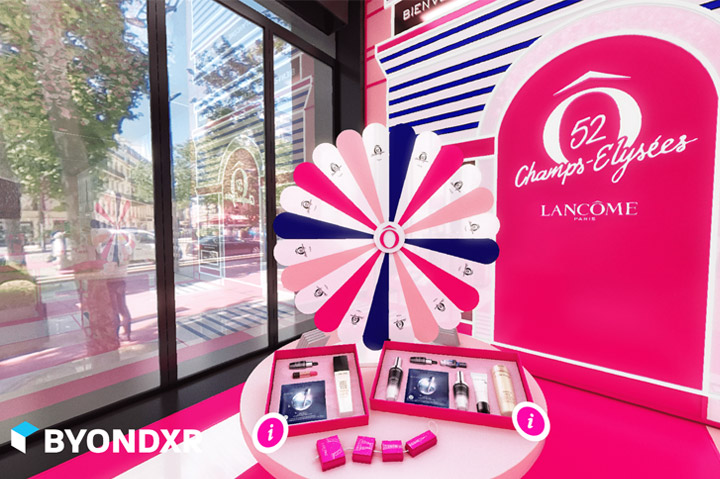Strategy October 05, 2021
Interactive, Virtual Showrooms Could Be Future of E-Commerce
This tech company is taking online shopping beyond the endless scroll.
E-commerce has been around for years and has grown by leaps and bounds, especially during the pandemic. Emarketer predicts that global online sales will reach $5.4 trillion next year, representing about 20% of total retail sales. And yet, despite the continued growth, the actual experience of shopping online hasn’t changed all that much since the days when Amazon was a just a place to buy books.
“Traditional e-commerce just uses 2-D figures with images and visuals,” says Noam Levavi, CEO of ByondXR. “It all pretty much looks the same – the same endless feed. It’s very dull and boring.”

ByondXR has worked with major brands like Lancôme to create immersive virtual pop-up stores that include mini-games and livestreaming.
ByondXR is an attempt to make shopping online a more immersive and enjoyable experience. “There are many people who can go to a shopping mall, spend a few hours and buy one or two products and are still happy,” Levavi says. “They had an experience. This is really missing today in the e-commerce world. That’s kind of what we’re bringing – the excitement and fun of exploring a store.”
Founded in 2016 by Levavi and Eran Galil, ByondXR builds virtual store simulations and dynamic virtual showrooms that allow consumers to view comprehensive product details and make purchases directly from the showroom. “We’re creating everything in a 3-D photorealistic environment, and we can stream those environments very quickly to any device or browser,” Levavi says. “You can actually walk in the store and look at the different products.”
ByondXR created this virtual showroom for Mitsubishi Electric.
ByondXR has worked with a number of major brands that are looking to expedite their digital transformation or appeal to younger shoppers. Lancôme, for example, first partnered with ByondXR in February, and since its first pop-up, the beauty brand has seen a 350% increase in customer engagement in its virtual stores that recreate the look of brick-and-mortar locations. In addition to being able to browse and make purchases, the pop-ups allow shoppers to play games, win prizes, attend beauty panels with influencers and experts, and have virtual skin care consultations.
The interactive virtual pop-ups have been a particular hit with Gen-Z shoppers, according to Françoise Lehmann, Lancôme global brand president. “With younger customers increasingly looking for an enriched and personalized experience, the virtual stores are a perfect way to engage and deepen connections with new and existing audiences, empowering them to discover our products in an exciting, new way and setting Lancôme apart from its traditional e-commerce competition,” she said in a press release.
Incorporating mini-games and livestreaming into virtual stores also helps increase the amount of time shoppers spend on a particular page, according to Levavi. “What we’re able to do is increase engagement time from 20 seconds to five minutes, something brands never saw before,” he says.
Levavi doesn’t think e-commerce and virtual stores will go away anytime soon, even after the pandemic is no longer a factor. In fact, he foresees even more immersive digital experiences to emerge as augmented and virtual reality improve and smart glasses become more mainstream. “Instead of looking at a very small screen on my phone, I can walk in my living room and be in a store like I’m there, looking at different products and trying them out,” he says. “It’s a whole new type of engagement.”
